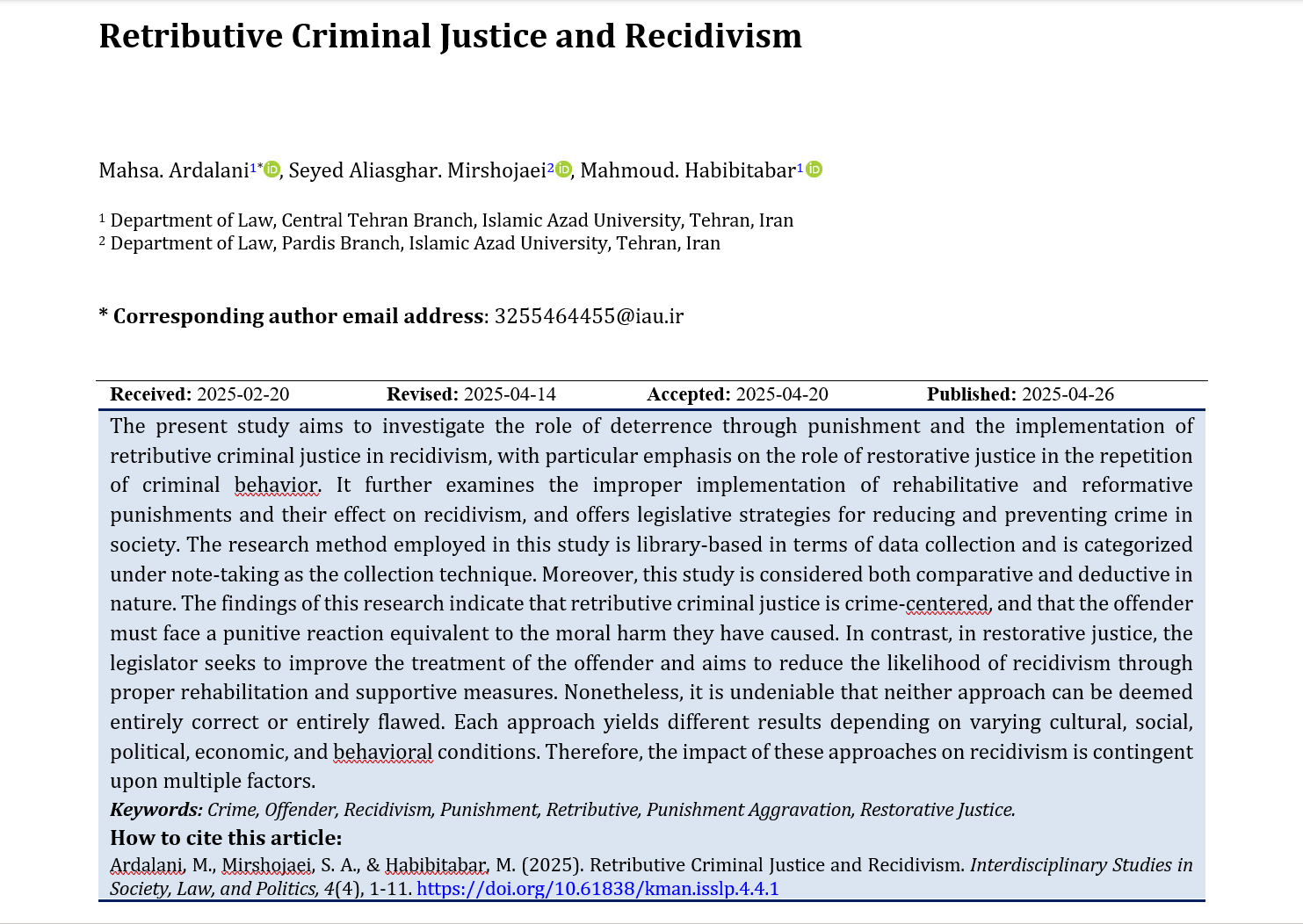Retributive Criminal Justice and Recidivism
Keywords:
Crime, Offender, Recidivism, Punishment, Retributive, Punishment Aggravation, Restorative Justice.Abstract
The present study aims to investigate the role of deterrence through punishment and the implementation of retributive criminal justice in recidivism, with particular emphasis on the role of restorative justice in the repetition of criminal behavior. It further examines the improper implementation of rehabilitative and reformative punishments and their effect on recidivism, and offers legislative strategies for reducing and preventing crime in society. The research method employed in this study is library-based in terms of data collection and is categorized under note-taking as the collection technique. Moreover, this study is considered both comparative and deductive in nature. The findings of this research indicate that retributive criminal justice is crime-centered, and that the offender must face a punitive reaction equivalent to the moral harm they have caused. In contrast, in restorative justice, the legislator seeks to improve the treatment of the offender and aims to reduce the likelihood of recidivism through proper rehabilitation and supportive measures. Nonetheless, it is undeniable that neither approach can be deemed entirely correct or entirely flawed. Each approach yields different results depending on varying cultural, social, political, economic, and behavioral conditions. Therefore, the impact of these approaches on recidivism is contingent upon multiple factors.
Downloads
References
Abbasi, M. (2003). Restorative justice: A new perspective on criminal justice. Journal of Public Law Research, 5(9), 85-129.
Asghari, Z. (2014). Prison reduction and its role in preventing recidivism. Journal of Crime Prevention Studies, 10(33).
Babaei, M. A. (2004). Recidivism prevention. Judicial Law Journal(47).
Bayati, P., Pouladi, E., Fattahpour, E., & Pouzesh, M. (2020). Exploring the role of restorative policing in recidivism prevention. Police Criminology Research Journal, 1(1), 27-49.
Dadban, H., & Aghaei, S. (2009). Deterrence and its role in crime prevention. Law Quarterly, Faculty of Law and Political Science, 39(3), 125-148.
Fadaei, H., Sallar, R., & Orouji, A. (2019). The effect of security and corrective measures in preventing recidivism among dangerous and repeat offenders. Social Discipline Journal(1).
Gholami, H. (2011). Recidivism. Mizan Publishing.
Hadadi, H., & Salehi Tayeblou, M. M. (2021). The impact of individual skills and police situational prevention on recidivism (Case study: Yasuj). Ghanoun Yar Journal, 5(18).
Hezarjaribi, J., & Safari Shali, R. (2010). A study of the factors influencing crime commission (Case study: Prisoners in Markazi province). Social Sciences Quarterly(4).
Karimi, M. S., & Kazemi, Q. (2020). Rules for intensifying punishment in Iranian and French law. Political Sociology Monthly, 4(3), 2848-2867.
Khalili Omran, M. (2013). The role of the criminal process in preventing crime and recidivism. Journal of Crime Prevention Studies(26).
Mahmoudi Janki, F., & Aghaei, S. (2008). A review of the deterrence theory of punishment. Journal of Law and Political Science, University of Tehran, 38(2), 339-361.
Malekzadeh, F. (2009). The nature of corrective and security measures from Islamic jurisprudence and legal perspectives. Journal of Theology(8), 127-152.
Mehra, N. (2007). Punishment and its determination in the English criminal process (with emphasis on penal functions). Journal of Legal Studies(96), 45-49.
Moazzami, S., Shiravi, M., & Salehi, M. (2015). The impact of imprisonment on female recidivism. Private and Criminal Law Research (Encyclopedia of Law and Politics), 11(23), 39-58.
Morris, A., & Maxwell, G. (2003). Restorative justice: A new model of criminal thinking. Journal of Public Law Research, 5(9), 183-205.
Mousavi, M., Sarvar, R., Kabiri, A., & Esmailzadeh, K. (2014). The effect of employment loans on preventing recidivism and re-incarceration (Case study: West Azerbaijan province). Law Enforcement Geography Research Journal, 2(6), 57-90.
Najafi Abrandabadi, A. H. (2008). Crime prevention and the police (Introduction to the National Crime Prevention Congress). Office of Applied Research, NAJA.
Najafi Abrandabadi, A. H. (2020). Criminology (Georges Picca). Mizan Publishing.
Ne'mati, L. (2015). Strategies for crime prevention. Baqer al-Olum Research Institute.
Nikfar, S. (2016). Aggravation of punishment as a criminal law approach to recidivism. Shabak Journal, 2(12), 1-14.
Nouraei, Y. (2015). A jurisprudential and legal review of recidivism with emphasis on Article 136 of the Islamic Penal Code. Journal of Islamic Jurisprudence and Legal Research, 11(40), 127-144.
Pourbafrani, H. (2005). Multiplicity and recidivism in Iranian criminal law. Modarres Humanities, 9(41), 25-46.
Pradel, J. (2021). History of Criminal Thought. SAMT Publishing.
Qomashi, S., & Motaghi Ardekani, O. (2020). The goals of punishment under the behavioral paradigm. Criminal Law Research Quarterly, 8(30), 83-108.
Salimi, M., & Rahmati, S. R. (2018). An introduction to criminal responses to criminal phenomena. Amol Publishing.
Samavati Pirooz, A. (2006). Restorative justice: A gradual moderation or a shift in criminal justice. Negah-e Bina Cultural Publishing Institute.
Sedigh Sarvestani, R. (2011). Social Pathology. SAMT Publishing.
Soltani, M. R. (2018). Criminal review of recidivism and the professionalization of offenders in Iran's current system. Ghanoun Yar Journal, 2(6), 211-238.
Vorouaei, T., & Vorouaei, A. (2016). The effect of social rejection on female recidivism after prison release. Social Discipline Journal(2).
Yaghoubi, M., & Elmi, M. (2017). The role of family and social factors in prisoners' return to prison. Journal of Sociological Studies, 9(35), 7-23.

Downloads
Additional Files
Published
Submitted
Revised
Accepted
Issue
Section
License
Copyright (c) 2025 Interdisciplinary Studies in Society, Law, and Politics

This work is licensed under a Creative Commons Attribution-NonCommercial 4.0 International License.





